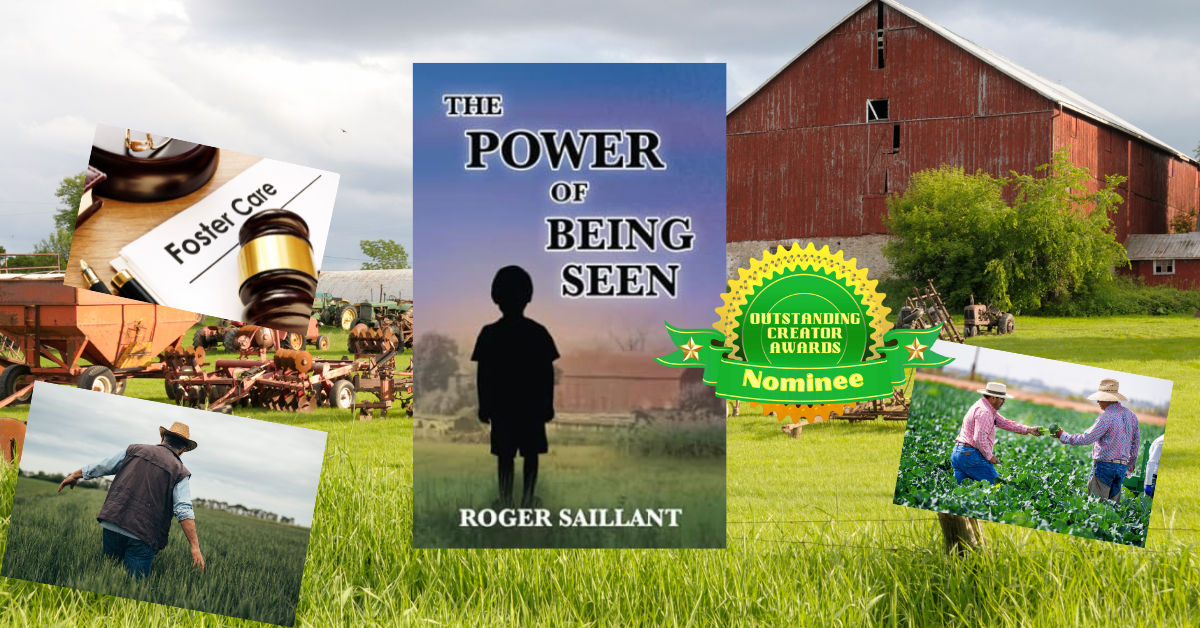|
Score: 96/100 (9.6 out of 10)
The Power of Being Seen by Roger Saillant joins our list of elite memoirs and autobiographies! What a magnificently compelling book! This is a haunting and mesmerizing glimpse into the foster care system, specifically in the middle of 20th century America before major reforms. The Power of Being Seen follows Roger, given up in the first year of his life to the foster care system. The governing body of the Pennsylvania foster care system, the Children's Aid Society, set Roger up to be exploited for free labor on a farm in exchange for room and board. He is taken in by foster parents, Mr. and Mrs. McClelland, a family that owns a large farm full of a whole lot to do. And that's where the great intrigue of this book comes from: the farm life. Roger's life on the farm is absolutely captivating. It's so different from what most city people are accustomed to. It's so foreign to the average person who works an office job. There are so many wild and crazy things that happen to Roger on the farm that you just wouldn't read about in most other memoirs. It's really special and unique. For example, there's an instance when Roger encountered a trapped skunk for the first time and was tricked by his brother on how to deal with it. The author describes these otherwise mundane instances with so much detail and passion that you can't help but lean in and read closer. We found ourselves extremely engaged with the text! Captivated by it! There are several core conflicts in this book, but perhaps the one that demands the most attention is the conflict between Roger and Mr. McClelland, his abusive, belittling, and exploitative step-dad. However, Mr. McCelland, the central antagonist of the book, is not presented as pure evil. His motivations for using Roger for labor and being hard on him are presented in an understandable manner. Mr. McCelland was an Irish immigrant who grew up only knowing a Puritan work ethic and subsistence farming. He grew up knowing that if he didn't work, he would starve and die (which is quite ironic... anyway...) Mr. McClelland comes across as an oppressive force: a dream killer and buzz joy in Roger's life. Whenever it seems that Roger has an opportunity to improve his life such as representing his school to the university, joining the football team, or competing in the state championship tournament for wrestling, Mr. McClelland is quick to squash those hopes and dreams either through his words, decisions, and actions. On the other hand, Mrs. McClelland is a much more empathetic, compassionate, and caring figure who helps to instill goodness and conscientiousness in Roger (as well as a lifelong love for God and his will). Mr. McClelland helps to instill in Roger a staunch work ethic and discipline. The farm work also makes Roger one of the strongest males in his community, something which comes in handy in football, wrestling, and possibly even tennis. It also makes him able to beat up bullies nearly twice his age. Another key relationship in this book is the relationship between Roger and his foster brother, Richard. Richard, in our opinion, is a jerk. Richard just comes across as a very unlikable person. He's constantly mean to Roger, getting him into trouble, tricking him, and even physically abusing him. He's a secondary antagonist after only Mr. McClelland (and, arguably, the system). However, it becomes easy to forget that Richard is a troubled foster child too. He was also robbed of a stable, steady future by his circumstances. It is even said that he didn't have a dating life due to the asylum-like life on the farm, compounded by a lack of transportation and social interactions. So, in a sense, Richard is a victim of circumstance and the system as much as Roger is. The incredible thing about Roger's life is how he's able to overcome all of these circumstances and still make something of himself, becoming successful in football, wrestling, and in academics. It is said that he would've done well at Harvard, but that his psychological problems (from years of abuse and trauma) keep him from using his intellectual gifts. Incredibly, if we remember correctly, he actually had several huge scientific achievements, honors, and recognition over the course of his life. The over-arching theme of this entire book is encapsulated in the title. “The Power of Being Seen” is an allusion to the fact that people like Roger suffer in plain sight of social workers, medical professionals, educators, and neighbors. However, how likely is it that one or more of these people will actually do something to help them? Only one of Roger's social workers actually recognizes the wrong that's been done to him and does what he can to try to correct it. One doctor recognizes that Roger has suffered a hernia from his intense farm work. A friend's father recognizes that Roger should do other things like tennis. A friend's mother recognizes that Roger should learn to drive. The Pearsons recognize that Roger could benefit from therapy. It's people like this who recognize something wrong and do something about it that the book applauds. Check this out on Amazon!
0 Comments
Leave a Reply. |
Archives
July 2024
Categories |

 RSS Feed
RSS Feed